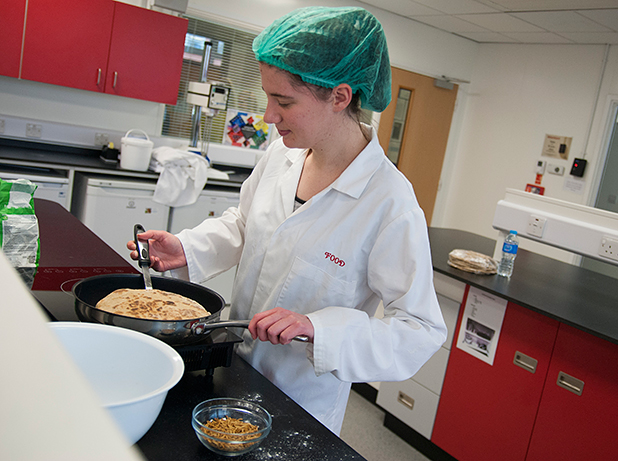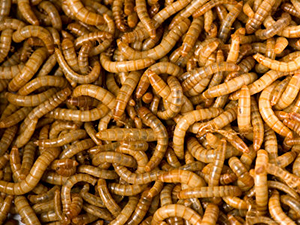Student wins competition using protein-packed ‘mealworm’ bread
 Food scientist Gemma Lamb wins the Institute of Food Science and Technology’s North of England Young Scientist Competition.
Food scientist Gemma Lamb wins the Institute of Food Science and Technology’s North of England Young Scientist Competition.
Fri, 29 May 2015 10:00:00 BST
Food scientist Gemma Lamb wins IFST competition – “mealworms could be a valuable and environmentally-sustainable source of protein for human beings”
ADDING mealworms to her bread might not take University of Huddersfield student Gemma Lamb very far on the Great British Bake Off, but when she served it up to food scientists, the recipe and the research behind it were enough to scoop an award.
She entered the Institute of Food Science and Technology’s North of England Young Scientist Competition, was selected as a finalist, and after giving a presentation – which included the panel of judges sampling her protein-packed ‘mealworm’ bread – she was announced as a winner. Prizes include £200 cash and a year’s free membership of the IFST.
Gemma, aged 22, is in the last stages of her University of Huddersfield BSc degree in Food, Nutrition and Health. The project that earned her victory is the basis of her final-year dissertation and it has left her in no doubt that if people in the West overcame their prejudice, mealworms could be a valuable and environmentally-sustainable source of protein for human beings.
“The trend for protein is going higher and higher in the UK and in other countries. So we are going to have to start to think of alternative sources,” said Gemma. “When mealworms are farmed they produce much less carbon dioxide and don’t need as much land as cattle.”
Mealworms as an ingredient
 Mealworms are actually insects – the larval form of a beetle – and they have tiny legs and antennae. They are readily available in the UK as animal food and in some parts of the world are widely marketed as a nutritious snack for humans.
Mealworms are actually insects – the larval form of a beetle – and they have tiny legs and antennae. They are readily available in the UK as animal food and in some parts of the world are widely marketed as a nutritious snack for humans.
“Yes, I have eaten them!” said Gemma. “They are fine – just crunchy and don’t particularly taste horrible. But they do have a distinctive smell and that is what puts you off rather than the actual taste.”
The project to investigate mealworms as an ingredient was one of a roster of projects suggested to Food, Nutrition and Health students by their tutors, Dr Vassilis Kontogiorgios and Dr Helen Martin. Gemma decided to grind up the insects – after obtaining food grade mealworms – and use them as an ingredient in bread.
She found that her loaves would not rise as a result, so she baked them as flat bread, and this enabled her to introduce a higher mealworm content, boosting the protein and fibre content. In order to mask the mealworm smell, she included copious quantities of basil and garlic.
Gemma conducted a sensory analysis test, serving up her bread to fellow students. She included control sample without mealworms. Analysis showed that ultimately there was no difference in the response between the two recipes, so she concluded that mealworms could be made more widely acceptable.
Career in food
It has been a fascinating project and Gemma’s IFST award is a valuable addition to her CV, which already includes an absorbing year’s work placement with Bradford-based Sun Branding Solutions, where she worked on food label compliance.
And now, as she prepares to graduate, she had secured a job as a process technologist at high-end sauce manufacturer New Ivory, based in Elland.
Gemma has been bent on a career in food since her days at Bishop’s Bluecoat School in Chester, where home economics was her favourite subject. She then sought a suitable degree course and the University of Huddersfield had just what she wanted.
She was one of two successful finalists from Huddersfield who took part in the IFST contest, held in Manchester. Also competing was her fellow undergraduate Katie Baker, who has been investigating pasta enriched with seaweed.







